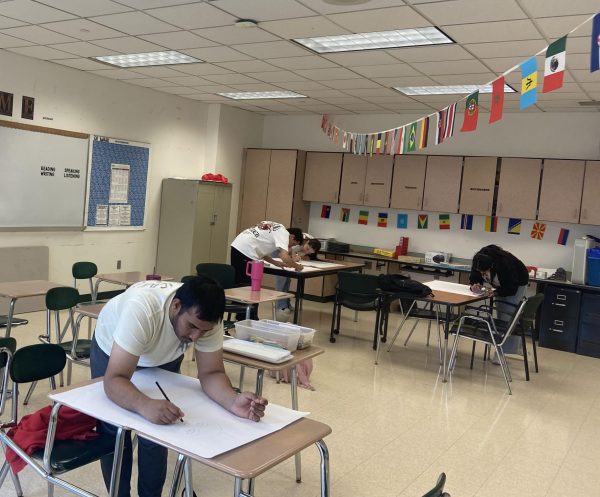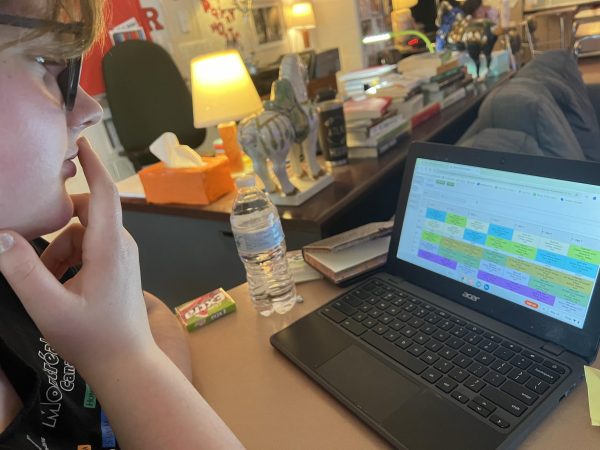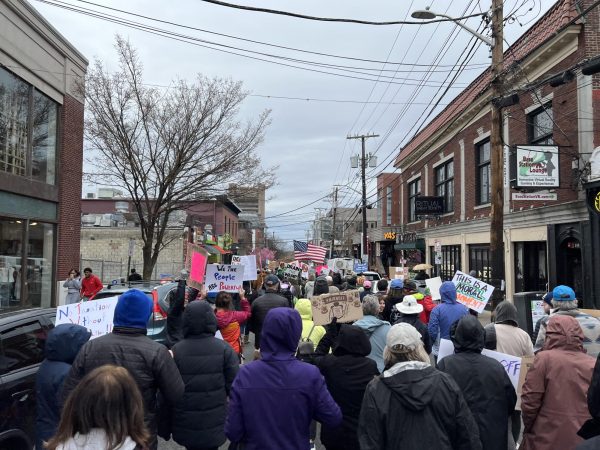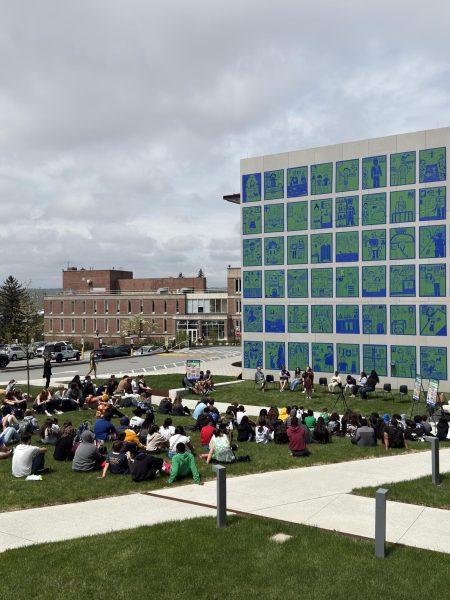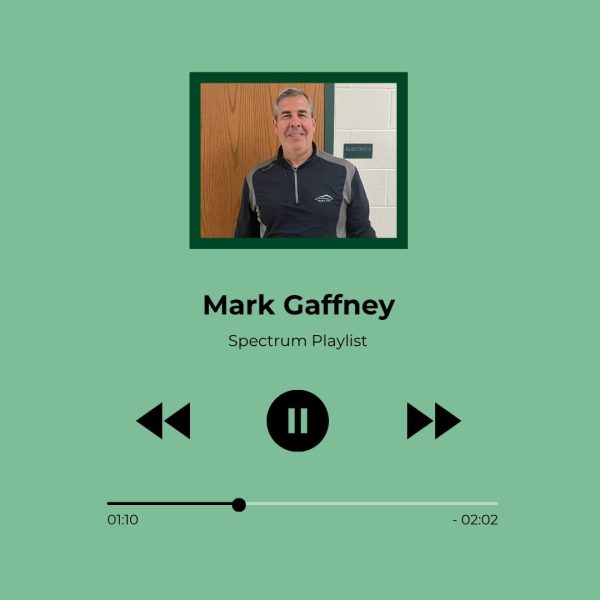Mayflower 400 Essay Contest Winners
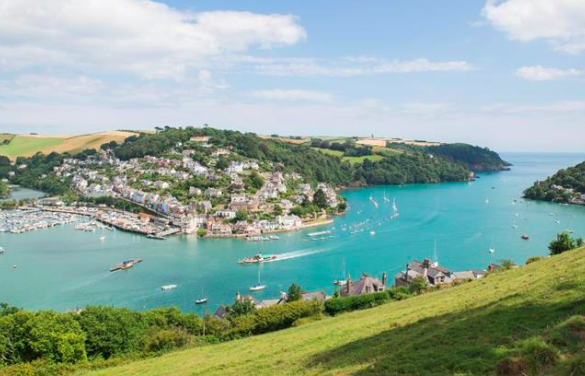
Dartmouth’s sister city in Dartmouth, Devon, England as pictured on the town’s website.
The Dartmouth Sister City Committee is joining with other communities in Massachusetts to celebrate the 400th anniversary of the arrival of the Pilgrims. As a way of involving the schools in Dartmouth, we sponsored an essay contest last May. Students in Jeffrey Reed’s AP American History class participated. The winners are: First Prize, Reese Leconte; Second Prize, Jaffa Heryudono; and Third Prize, Lauren Nielsen. Congratulations to the winners. They were presented with gift certificates.
This project was done in conjunction with our Sister City in Dartmouth, Devon. In addition to celebrations in Plymouth, Devon, Dartmouth is marking the historic occasion with events all next year. And their students at Dartmouth Academy are also writing essays and creating art projects to commemorate the journey the Pilgrims took almost 400 years ago.
Many people may wonder how Dartmouth is connected to the Pilgrim story. One of the ships (the Speedwell) carrying Pilgrims from Leiden in the Netherlands, sprang a leak after leaving Southampton. They put into the nearest harbor, which happened to be Dartmouth, to repair it. Once completed they set out for the New World only to have the ship leak a second time. Both ships returned this time to Plymouth since it was closer. The decision was to leave the Speedwell behind and many joined the passengers on the Mayflower.
In addition to the essay contest (which we hope to sponsor again next year) our Committee is working with the Art Department at Dartmouth High School. Their project is to have the students create a ceramic tile illustrating their own family story of coming to America, thus paralleling the story of the Pilgrims. We are in the process of identifying an area where these tiles could be on permanent display. Another Committee project we are working on is to create and sew 150 pennants depicting nautical themes that we will send to the Mayflower 400 Committee in Dartmouth, Devon. Their goal is to hang 5000 pennants everywhere in town for Mayflower Week next September.
Sister City Committee members are: Bel Barreiros, Peggy Cabral, Mary Creed, Nicole Jackman, Dyan Kieltyka, Sheila Koot and Mia Lahti.
First Prize: Reese Leconte
Topic: The time is 17th century colonial Massachusetts. Your family recently emigrated from England to Massachusetts. Write a letter to a family member or friend who is living in the village or town where your family came from. Tell them about your life in America.
April 8th, 1622
Dear family,
I write today to share with you the joys of living in the New World! It is quite lovely and much different from any experiences back in England. However, the other families of colonists that are here lead very laborious lives. My parents and I just barely missed the harsh winter months, which we are all very thankful for.
Upon our arrival, the other men who had already been living in the village for quite some time immediately recognized my father a s an able-bodied man who could work to provide for the colony. The village we ended up in was centered around the idea of community and everyone helped everyone. For the next few days, as my father got busy gathering lumber, my mother and I learned the ways of colonial life. Lots of difficult labor it is! Sewing, cooking, and subsistence farming to feed our village. Hard work, but oh, how rewarding.
Since it was the beginning of the warm season, within a few days my father and a couple of other men had built a house for the new colonists. Since so many of us had embarked on this journey, my family and I had to live with two other families in our tiny cabin. It made things very difficult, trying to get three families‘ worth of meals and housework done in one tiny room, but we made it work. Getting the chores done was much easier with so many hands to help. Anyway I spent most of my time outside enjoying the fresh air.
One major difference between England and the New World is the gorgeous land and fresh air we breathe here! The soil is much different. There are rocks with every shovelful of dirt the men pick up. The soil grows sweet and tasty crops for the whole village to share. The men of the village spend most of their days cutting down huge trees to make room for incoming colonists. They believe there are many more ships to come. I like the look and feel of the forest in my new home, but I know that I am going to love the expansion of our village and so many more friends to experience this world with.
I did not want to mention this, but there are many dangers in the New World as well. The men have encountered tribes of native Wampanoag peoples out in the forests. Many of the colonists are afraid, and I agree it is frightening. But I have always believed that unless you give people a reason to be upset with you, then there should not be any problem. Some of the colonists, however, want the Wampanoags out. I do not think it is a good idea to spark a conflict like this, but no one is going to listen to a girl who has been in the New World for only two months!
Anyway, I would love for you all to come and join my parents and me in this glorious New World! It is much different than where we are from, but it is such an experience to live this life. To breathe this fresh air is simply something you cannot do at home, and if that is not enough to get you to come here then I do not know what is. I hope you will write back with news of your upcoming journey to Plymouth colony!
Your loving niece
Second Place: Jaffa Heryudono
Topic: You are on the ship that is taking you and your family to America. Write journal entries (10 minimum) that record your observations of the conditions on the ship and experiences during the journey.
September 6, 1620
One hundred two of us have dared to board the Mayflower in search of a life that awaits beyond the sea. I am joined by my husband, William, and my daughter; there is nothing left for us here. I let myself hope the New World will be paradise.
September 12
I have hung sheets between my family and others, and though the white of the cloth has long been stained, any bit of privacy is appreciated. Will and I sleep on the floor so our daughter can take the hammock bed. She has just turned two years, you know. It is getting more difficult to keep an eye on her, though there is not much room to wander on the cramped ship.
September 16
There have been rumors plaguing the passengers. Whispers of the word ‘sickness’ spread from ear to ear faster than any disease. I heard Will cough last night. I have told him to rest and eat more–he says he has lost his appetite.
September 23
It is ironic, really. Back home I would whine about gaining weight, but the lack of good food has made it easier to slim down. Ship fare is less than enjoyable, lots of what we eat is dried; dried meat, dried cheese, dried fruit… There is plenty of beer, though. I can stomach anything as long as I have a drink to follow. My husband and daughter, however, are far pickier than I. Will scrunches his nose up at the daily meals of cabbage and fish while the only thing my daughter eats is hardtack.
October 1
I used to think the ocean was beautiful. Oh God, was I wrong! Yesterday we sailed through our first storm, and I promise there is nothing louder than the sound of waves against the wood. No matter what I did, my daughter would not stop crying.
October 7
Wills gets seasick. He has hidden it from me until now. The only reason I know is that I found him in a dark corner emptying the few contents in his stomach. I told him that it is fine, really; a majority of the passengers find the constant rocking of the boat unpleasant. I am more concerned with how his infrequent coughs are becoming a daily occurrence.
October 19
No matter which way I look, all I can see is water. Blue has quickly become my least favorite color. Nevertheless, I was told we are more than halfway there! There is not much to do on board, so I have been spending a lot of time with my daughter. I tell her stories every night before blowing out the candle and erasing the only source of light below deck.
October 24
The air in the ship burns my nose and I miss the feeling of the sun. I ask Will to take a walk on deck with me to get fresh air, yet he insists on lying in bed. I tell him it is not healthy, staying in the dark all day. But the fact that his voice barely rises above a whisper convinces me to let him stay. He continues to drift off to sleep.
November 6
Did I ever say why we took this journey to the new land? To raise our daughter in prosperity, and for freedom to pray separately from the Church of England, whose ways we found corrupt. Now I find myself praying for my husband who did not wake up!
November 9
Someone above yells the words ‘LAND’. I do not know what it means, but I grab my daughter’s hand and pull us up from beneath into broad daylight. For the first time since we departed, when I look beyond the rails of the ship, it is not the ocean I see in front of me.
Third Prize: Lauren Nielsen
Topic: The time is 17th century colonial Massachusetts. Your family recently emigrated from England to Massachusetts. Write a letter to a family member or friend who is living in the village or town where your family came from. Tell them about your life in America.
20 November 1630
My Dearest Elizabeth,
Oh, how I do miss you! Is all well in England? A few days prior to this, we arrived in the Americas. Our voyage was tortuous! The seas were remarkedly rough and there was little food aboard the ship. I lived off of only some hard biscuits and dried fruit for weeks. It is so gruesome to recall that just a fortnight ago, a father of seven was thrown into the sea during a passing storm. I prayed to God that nobody else would endure such a tragedy as his poor family did. Many other passengers on the ship just experienced some seasickness. Believe me, Elizabeth, the stench aboard was absolutely dreadful!
Once we at last reached our destination of Plymouth Colony, God blessed my mother, my father, and me with an adequate house in a small settlement right off the coast. There is a river that runs right along the back of the land. My father says it will protect us from the natives, who are the enemy. I hear that these people are surly and willful. I pray they do not hurt my family, considering there have been some barbarous conflicts between some of us and some Indians in the past. I am grateful to have not yet encountered any of these native people.
Our house is built of wattle and daub. It has a thatched roof made from local grasses. Inside there are very few windows so it is ordinarily very dark. We rely on a hearth to provide us light and warmth. The house is also exceptionally cramped inside. We have to stockpile our food and other goods in a loft, which is a storage place. We also keep a chamber pot in the corner of the house for use during the night or a storm. I usually make father dispose of the waste! I am still adjusting to it all. It is much different than the style of living back in England.
This morning after we broke our fast, I ventured outside and met another young girl who lives in the same settlement that I do. Her name is Charity. You would adore her! Charity invited me into her house. Her mother, Goodwife Clarke, gave me some pottage and light beer to share with my family. And Charity taught me how to sew a petticoat out of linen. I wish mine came out as good as the one she made. Maybe I can make one for you, too. She said her mother has been teaching her how to perform all household skills since she was very young.
Charity’s brothers work in the field with their father, Goodman Clarke. He teaches them how to plant and harvest crops. Their family grows different foods like potatoes and squash. Other families here in Plymouth rely on trading or selling timber products as a source of income. The soil is much more suitable for farming if you travel further to the South. Most of the land in this region consists of low plains or dense forests.
Oh Elizabeth! I was filled with gratitude to safely arrive in the New World with my family, but now I am starting to wish that we never left England. Things here are just so different. I know that in England my father was severely punished for following his own religious beliefs, but I often wonder if there could have been another way to resolve this quandary. I am petrified that things could get worse here in America. I am worried that we will all get killed by some Indians or run out of food. I pray that with God’s help we will be able to survive this upcoming winter. I will let you know how it all works out.
Fare thee well,
Abigail


